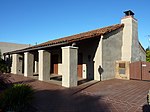Silicon Valley is a region in Northern California that serves as a global center for high technology and innovation. Located in the southern part of the San Francisco Bay Area, it corresponds roughly to the geographical Santa Clara Valley. San Jose is Silicon Valley's largest city, the third-largest in California, and the tenth-largest in the United States; other major Silicon Valley cities include Sunnyvale, Santa Clara, Redwood City, Mountain View, Palo Alto, Menlo Park, and Cupertino. The San Jose Metropolitan Area has the third-highest GDP per capita in the world (after Zurich, Switzerland and Oslo, Norway), according to the Brookings Institution, and, as of June 2021, has the highest percentage of homes valued at $1 million or more in the United States.Silicon Valley is home to many of the world's largest high-tech corporations, including the headquarters of more than 30 businesses in the Fortune 1000, and thousands of startup companies. Silicon Valley also accounts for one-third of all of the venture capital investment in the United States, which has helped it to become a leading hub and startup ecosystem for high-tech innovation. It was in Silicon Valley that the silicon-based integrated circuit, the microprocessor, and the microcomputer, among other technologies, were developed. As of 2013, the region employed about a quarter of a million information technology workers.As more high-tech companies were established across San Jose and the Santa Clara Valley, and then north towards the Bay Area's two other major cities, San Francisco and Oakland, the term "Silicon Valley" came to have two definitions: a narrower geographic one, referring to Santa Clara County and southeastern San Mateo County, and a metonymical definition referring to high-tech businesses in the entire Bay Area. The term Silicon Valley is often used as a synecdoche for the American high-technology economic sector. The name also became a global synonym for leading high-tech research and enterprises, and thus inspired similarly named locations, as well as research parks and technology centers with comparable structures all around the world. Many headquarters of tech companies in Silicon Valley have become hotspots for tourism. More recently, extensive droughts in California, further complicated by drainage of the regional Anderson reservoir for seismic repairs, have strained Silicon Valley's water security.








